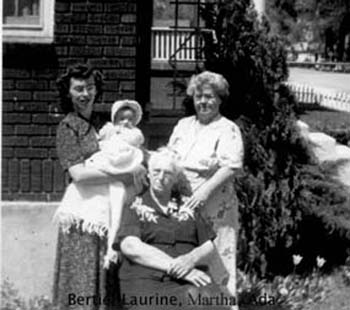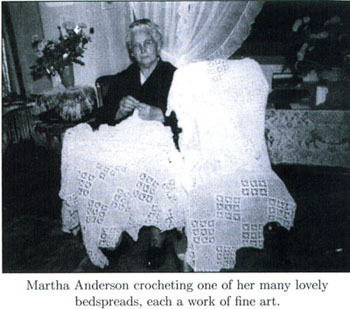



Martha Caroline Thomander Anderson
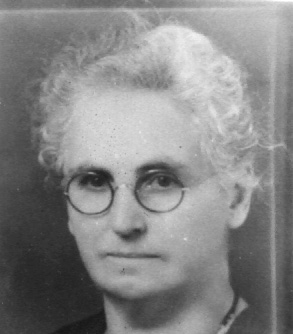
My dear Children:
I am starting to write my life history, the best that I can remember. My mother Ingeborg Pehrson Thomander was born in Malmo, Sweden. Her parents were very talented, her father was a carpenter and a gardener. He had a very fine home and a large garden-in this garden had budded 14 kinds of fruit on one tree, and his carpenter work was very fine. He had a light complexion, was six feet tall (his name was Truls Pherson). My mother's mother was very talented-she taught school and she could do all kinds of handwork. She could do fancy weaving and she made some fine rugs-one with a horses' head on it and the other with a dog. She did some fine embroidery. As it was so hard for children to go to school, she would sit by her mother's side and read, while she would knit. Mother studied in that way and in those days they went and read for the priest. She did not learn to write. Her mother was a small woman (her name-Karna Pherson) dark complexion.
In those days it was stylish to have wine to drink when they had parties, and when my mother was ten years old, someone had a party and were very free with the wine. They gave her father enough to make him drunk, and while in this condition got him to sign a note for many hundreds of dollars. Well, he could not pay the note, so he lost his lovely home, garden and everything. Well, that was awful hard on his family. They had four boys, and mother was the only girl. Her mother was an only girl, and I am an only girl-no sister. Well, they all had to find work. Mother worked in knitting factories, and as conditions were so hard, she did not get any schooling, but there was nothing in handwork that she couldn't do.
When Mother was 18 she heard the Mormons and joined the Church. She was so happy after she was baptized that she hastened to tell her parents, and when they heard that she had joined the Church, they told her to go and never darken their door again. She tried for two years to come to America.
When Mother was 19 years old she met my father, Peter Thomander, who was a missionary. He was tall, and very handsome, with brown curly hair and brown eyes. His father was very high in the sectarian church. He was a Bishop, and in those days a Bishop had as much authority as a king, and everyone gave him high honor.
Well, in 1862 Father and Mother came to America in the same sailing ship. It was the poorest ship to cross the Atlantic, and the captain let the ship so far north there was not enough wind to move it, and they were on the Atlantic Ocean three months. Many people took sick and were thrown overboard. The water turned sour, food ran short, and there was a great deal of suffering. But mother was wonderfully blessed. She was not sick a day on the whole journey. On the way back, this ship sunk. A book has been written about the trials and terrible hardships the people went through.
My father was very nice to mother all the way, and when they came to New York they were divided into companies. It happened that the one mother was in, was a very hard one. Her captain was a very selfish man and he did not deal out the food in a fair way. Mother almost starved, and they went through many hard experiences while crossing the plains. One of the wonderful experiences she mentioned was: they had three yoke of oxen and the day was hot and no water for miles. As they were crossing a bridge on a very deep river, the head yoke of oxen threw themselves down, and in a miraculous way the big hook came undone, and they both fell in and were killed. The other yoke of oxen did not fall in. While on the plains, the captain was a very jealous man. He said mother had too many things with her and made her throw some things away. Among the things was a sewing box her father had made for her. She said it was a beauty, covered with mahogany wood. Well, the captain picked it up and kept it. She told me of many more experiences, but I was young and did not take enough notice.
They arrived in Salt Lake in 1862, and father and Mother were married in the endowment house. Edward Peter, my brother, was born in 1864. They had gone to Ephraim, Sanpete County and lived there for about three years.
Brigham Young was President of the church at that time and it was a custom to call various families to settle in different parts of Utah. My parents, along with many others, were called to help build up a new place, they called Circle Ville (or Circle valley, Utah), some 200 miles from Ephraim. This was in the year 1865. My father dug a hole in the ground, using cotton-wood logs to make a roof, with dirt over the logs. The floor was dirt, the only door was made of hand hewn logs. There was no glass to be had, so the only window was a hole left in the logs. They had no stove, so a fire place was necessary. Mother did her cooking in an iron kettle, it had eight legs. In it she also did what baking she could. Her bed was made of grass and leaves on the dirt floor in the corner with a log to hold it in place. He found some straw and covered the bed with that and I was born in that cellar.

The Thomander dugout in Circleville, Utah.
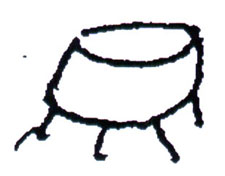
The iron kettle used to cook in Circleville, Utah
One day when my brother Edward was two years old, mother was alone with him, and two large Indian bucks came into the Cellar. They saw a butcher knife was laying on the log table. They took the knife up and fooled with it, for quite a while. Mother did not dare to move as there was no way to get out, so she prayed that the Lord would help and send the Indians away. They went out the door and mother and the baby were saved. The Indians were very mean to the white people. One day Father went after a load of wood. The Indians spied him and after him they went, but father threw his ax down and ran faster than the Indians. They killed two men and scalped them, carrying their scalps with them and making foolish of them.
I was born June 12, 1866 in that humble cellar. I don't know ho took care of mother at the time. When I was 12 days old, the Indians started driving the white people out of Circle valley. My mother had to leave, along with others, but father was called to stay and keep guard. A family said, if she would walk, she could follow them. She also had a cow and a calf to take care of. Well, she did walk, over hills and hollows and brush, carried me under one arm, and my brother under the other. They had ox teams to haul their few belongings. The Indians were following them all the way. They arrived in Ephraim, with no place to go, but a woman who knew mother, asked her man if mother could stay there till my father could come. He said she could
When my father came to Ephraim he found a very small room for the family. In those days President Brigham said the people who has land in the city districts must sell them, so the land was divided up into 5 acre lots. Father bought a lot for $75.00 in a good location. He built a very small two room, doby, half roof house. He used poles with willows, and then one foot of dirt for the roof. He smoothed out logs for the floor for one room, the other was dirt. The fire place was used for heat and cooking. When I was three years old, he bought a stove and some cooking dishes. That meant the fire place must be taken out, so a post was placed under the middle log to hold it up. That post was there for 16 years. My brother Oscar was born here and when he was two years old he died. One month later my brother Daniel was born in the same house. Mother was very sick and nearly died. At this time my father worked in a carpenter shop. We were very poor, and it was hard to get flour so mother gathered greens of all kinds to cook for food.
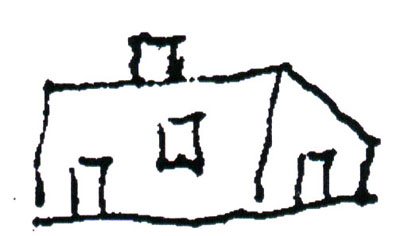
The Thomander half-roof house in Circleville, Utah.
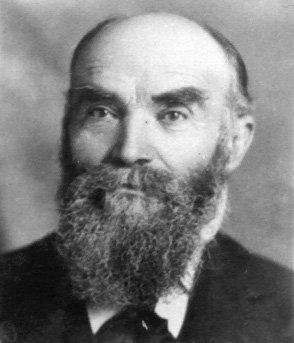
As time went on father was not living right, and became very mean to mother. He would beat her and one day struck her so hard he broke her nose. And so it went from bad to worse. The year I was six years old they separated and father left home. I never saw him again.
It fell to mother's lot to take care of three children. For three months all she had to feed us was a pan of flour to make thickening for the greens that she could pick, such as pig weeds, and mustard, and after that all she could get was very coarse bread and molasses. It would have been awful if she had not been a smart woman. She was a very faithful woman and taught us how to pray. Well I can remember my first prayer. It happened the Relief Society had a knitting machine she could use, so in that way she earned our food and clothes. She had five acres of land, two miles from town and she tried so hard to raise a little on it to help.
My mother is a woman of great faith, and her life has been full of rich experiences. When only 18 she became counselor in the Primary in Ephraim, being one of the first in that organization. She also taught in the Sunday School. Then for many years she devoted her time to her children and home, coming back as Pres of the Primary in the t hird ward in Ogden. She loved children and had a way of her own with them.
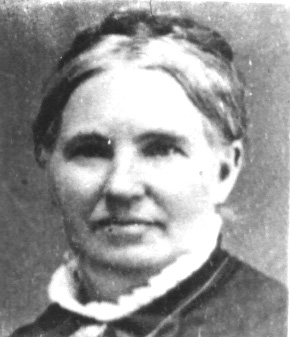
She was a firm believer in the adages: Better to wear out than rust out. And: You can't see how fast, but how well a thing is done. Each of her 7 girls were taught to sew and keep busy with their hands. To this time she has made 11 bed spreads, in 6 years, being now in her 76th year.
When I was six years old I started to go to school. My first teacher was Mrs. Armstrong, an elderly lady. If I can remember right I learned my ABCs. I must have been under fed because I was sick half of the time. I suffered so much with headaches. So my school days were limited. When I was 9 or 10 years old, along with my brother Edward, he was two years older than me, we would take a little bread and would carry something to get some spring water in to drink, that was our lunch. Then we would get busy pulling peas. That was the crop we had in one year. We went out for days pulling peas, then we had it hauled home. The boys an I we thrashed it with big sticks, then we had a man fan it in his fanning mill, then after it was cleaned mother hired a man to make us some wooden shoes. He charged so much for the shoes, it took nearly all the peas to pay him. I wore wooden shoes to school. Then we spent more years trying to make a little on our five acres, but failed, so we must go out weeding and picking potatoes for ten cents a day, and board ourselves. Then in the fall we could go out gleaning, so we could help get some flour to make bread. But everything was not hard. I was such a happy girl, and had many friends. When I was ten years old I hired out to take care of children at Jim Hegs for 75¢ a week. I worked there for three months. My pay was a calico dress and a cup.
In those early days we were taught to show the President of the church great honor and love. I remember on one occasion that President Brigham Young came out to Ephraim. Well, everybody were so happy to know he was coming, so show him how happy we were we decorated the meeting house and all along the way with flowers. I was just a small girl, but did all I could to help gather asparagus and holly-hocks so the bigger girls could fasten them and wind them around the gallery posts, and then we made a big welcome of flowers above the stairs and the men put four posts by the crick bridge, that they must drive through and another welcome was placed there, ad the posts covered with greens. I remember how happy I was to know the President was coming. He came in a white covered buggy. He had 3 other buggies along. The men in them were his body guards. In those days it was not so safe for them to travel alone. Well when the day came for us to have our beloved President Brigham come, the Sunday School, along with the band marched way out of town to meet him. The band played and we all waved our hands at him. He had a black stove pipe hat. He held it in his hand and bowed to all of us. Then they drove into Ephraim, the Sunday School followed. President young stood at the door and shook hands with all who dared to. I was too bashful and did not dare to. I have felt sorry many times to think I could have had that privilege, if I had dared. For many years we looked forward for the chance to meet our leaders, but when the railroad came it stopped that privilege. They came on the train and left and we never knew when. I am glad to know I have had the privilege to see and hear all the Presidents of the church, only the Prophet Joseph. The presidents were: Brigham Young, John Taylor, Wilford Woodruff, Lorenzo Snow, Joseph F. Smith, Heber J, Grant. I am also glad and thankful I had the privilege to hear and see several of the noble women-Eliza Snow, Sister Horn, Sister Hyde and more I cannot remember the names. Mother would take me to sister meeting (relief society) and I am glad she did. I have heard these sisters talk in tongues and others get the interpretation of what they said.
When the temple was near to the top, I and three others started to climb the scaffold. We got near the top, but getting down was no fun. The ladder I was on began to slip, but the boy close by caught me so I didn't fall. That was careless trick of mine to climb like that. I never see the temple without thinking what a wonderful building it is.
Along about the time the temple was being built, there was a grasshopper plague came to Ephraim. I with all the rest of the people tried with all my strength to help kill grasshoppers. There were so many hoppers we could not walk without stepping on them. Men dug ditches and had the water run through them. Men would stand in the ditches with gunny sacks to catch the hoppers as we would shoo them in and straw was put in many places to burn them as we would drive them in, so in that way they got burned. For two years this went on. In the fall of the year, the hoppers laid their eggs in the banks of the ditches and brush by the billions. Then in the spring the hoppers hatched and began to hop around and so close we would hardly see the ground. In this awful hard trial it began to rain and turn cold so that killed the grasshoppers.
In those days we were taught that service, no matter how small, it was worth something. I remember when Manti Temple was built, we children were asked to glean wheat and have it thrashed and pay it in to the help of the Temple. They said it might help buy a lock, or help buy a window, or something. I along with children went out gleaning. O it maid me so happy to do a little to help build such a wonderful Temple, and as years went on and the Temple got finished I had the privilege to go to the dedication of it and then Pa and I had the privilege to get married in it (1888) and sealed for life and eternity. O the joy of going through that Temple, then in years later we had the privilege to have 7 of our young folks get baptized in it, and we had the privilege to have Dru blessed for her health. She had been awful sick. It left her with a leaking heart. When they blessed her and said she should get well, she did. She never had a sign of leaking heart, she was healed instantly. (Note by Luella-I was baptized in the Manti Temple, and later in 1937 married there) We moved away so Lea and Zoy did not get the chance to get baptized in the Temple. Lea was baptized in the Ogden River, Zoy in the church font. My patriarchal blessing was also given to me in the Manti Temple by John B. Mabon, September 14, 1902.
I began to hire out for 75¢ a week. In those days we paid for our schooling. I was not so very well, I suffered so much with the headake, so school for me was very hard. I would do big washes for 25¢ a day, and black the stove and mp the floor, all in one day to help pay my schooling, then when I was in school, I felt so weak I would get sick and would have to stay home, so much of the time.
When I was 14 years old, Brother Gorge Q. Cannon came to Ephraim to conference. He asked the bishop if he knew of a girl they could get to be their son's, Sylvester's, nurse girl, so I went with Brother Cannon to his home in salt Lake. But nursing was not all I did, but plenty of hard work. They had seven big parties while I was there, and I helped with all of them. I had plenty of experiences there, but no chance to go to school. I was there for 8 months. Mother and Dan came to Salt Lake too. Mother worked along with me, and Dan went to George M cannon's school that winter. Then in spring of 1881 we went back to Ephraim. To our surprise the people had ruined our house and stoled everything they could carry away. So we must start over again to fix our home up. I hired out again for 75¢ a week. All I got at Cannons was $1.oo a week.
With my small earnings I would buy all my cloths and cotton yarn for tidies and quilt cloth. I bought 20 yards of quilt cloth for 5¢ a yard, at the Z.C.M.I. in Salt Lake in 1880. And I have one of my quilts lined with it now. (note-We turned this quilt into the General Relief Society Museum in the 1930s-it was still in good condition and very beautiful-a double wedding ring design as I remember). I made four quilts before I was 19. I started my trusseau when I was 8 years old. When I got a piece of calico, no matter how small, I took care of it and made them into blocks, so when I was 16 I made my first quilt. I made it a habit to go out in the chicken coop and pick up feathers. In that way I had two very nice pillows. I made two very pretty hooked rugs and some for mother. In those days home made carpets was a luctury (luxury). Mother and I we maid 50 yards of carpet. We colored the pale rags in many colors. The yellow we colored in the flowers of rabbit brush, the black in rag week (or log wood) and so on. I wove the 25 yards of carpet for my schear.
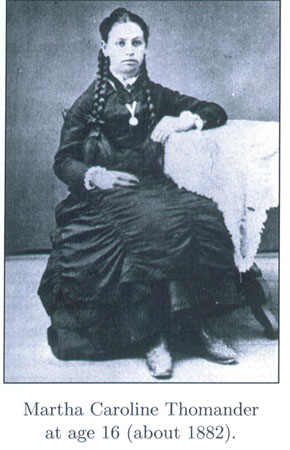
When I was 17 years old I again went back to Cannon's home in Salt Lake. I stayed 3months, then I came back home. Then when I was 18 I went to Johny Christansans school. He tole me I could go free and he would help all he could. He was so good to me and I learned more that winter than all the rest of my school days, and got out of the 4th Reader. Did I enjoy that school, but that was my last year of school. I had my other teacher to pay for the time I went there so I washed cloths for them for 25¢ a day, until I got my bill paid. The last wash I did was the 5th of November. The snow was six inches deep and I must stand out doors to wash. I got so sick with the worst toothake I ever had. It lasted 3 weeks without stopping. I thought I would die. We did not have and denis in town, so I went to a horse doctor I heard he could pull teeth. He pulled the tops off four and for years the roots bothered me. I still hired out and the main place I hires to was Lizzy Peterson. She taught me many things as she was an artist. She taught me netting and how to prepare the bundles of straw from the fields to braid for hats. I can braid 5 kinds of braid for hats and bleach and sew them. I braided many hats and sewed them.
When I was 18 I was also called to be first counsler to Gusty Stephens in the Primary (1884) I worked along with her for two years and we had many good times together. I also belonged to the Young Ladies, and was a teacher in Sunday School.
In those days the young people were all united in having good times. We would go to each others homes and play games and sing. We felt so happy to have someone to play the organ and then we would sing. We never went to the trubble to serve the boys and girls to get them to come to our homes to have a good time. We had big crowds of boys and girls and they were fine boys and girls. I remember one Sunday night there were 23 at our place. When they left after having so much fun, our jaws aked from laughing. They said-where will we meet next. We would go out sleigh riding, and buggy riding and horse back riding.
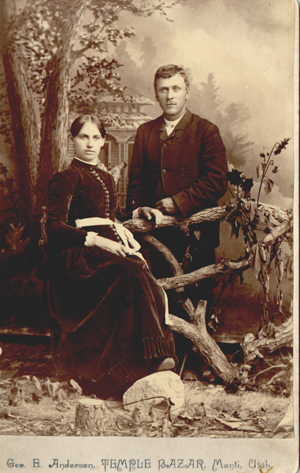
When I was 19, I met James T. Anderson. On the 2nd of July 1885, we six of us-three girls and three boys got together. Well, they maid cuts to see which girl should take the boys home, and the one I got fell to James. Well, he seamed to be very happy about it. We lived just one block apart, but as he was near 4 years older than me, I did not dear think of him for a boy friend. He said he had notis me for years and wanted to meat me and he also mentioned how he had notist my long hair. My hair was very dark, and so long nearly to my knees. Well, he took me home that night. On the 4th of July he asked me if I would go with him to a dance. I schure did feal proud to say yes, I would be glad to go with him, so Ellen, his sister, and her boy friend, we four got on horses and road out to the ranch to do Ellen's chores before the dance. O we had fun. We went down in the seller and had milk and cream, bread and butter, cheese and fruit for supper, then we road back to town and got redy for the dance. We schure had fun. James he was my best and only lover. One year to the day we were married-on July 2, 2886. I was 20 and two weeks old, he was 23 and 11 months old when we got married. We were married by C.C.N. Dorius, at Ephraim, Ut.
Well, that changed the scene. We were very happy and began to plan for our future home. We were poor like many others, so we must plan and save the best we could. He hurded sheep for the first 3 years, so he was away very much of the time. We rented a house while I was alone so much. I was maid happy to prepare for my little one. In those days it was stylish to make the clothes long and fancy. So time went on and on the 14th of April 1887 Ira came to us. A lovely baby. We schure thanked the Lord for him. By that time Pa tried to buy a farm “Crost Sanpitch” Sanpitch is a river west of Ephraim. Well, when our baby was five weeks old, Pa moved me over there. It was seven miles from Ephraim. There was just one family besides us living there and they were a mile away from our place. Me being so young and I had never been out of Ephraim much, I schure felt lonesome. Every day and night the wolves would howl and they came around and stold nearly all our chickens, and snakes by the hundreds. At first I was so scard of a snake I would scream and run, but I soon got over that. I must get brave and kill them, for many crawled under our house and got in the cellar. Others all around the house. One cralled on our porch in front of Dru and nearly scared her to death and another by Lucretia, so as time went on I could kill a snake and no care at all.
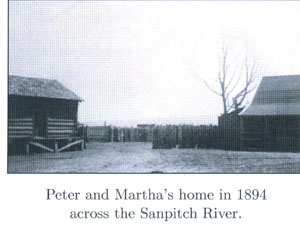
It was very heard to get to Ephraim, as the river spred over so much ground, one mile or more wide in places, and we never know how deep it was. There were so many deep holes, so when we tried to cross we would pell in mell in deep hole over the horses head, and we would get mired. O say I felt awful. I remember one time we had been to town, we had a double wagon box, the back end off, so when the box got full of water, it could run out, when the horses reached a high place. Well Is at in the spring seat, Ira on my lap, legs up in the seat, Well, here we drove in the river, we could not see the horses, just their heads and ears swimming for all they were worth. Well, when they got on the other side, and the water ran back out of our wagon, and we were safe, I thanked the Lord for once more being saved. Well, as I said, we only had one neighbor and that did not last long. One day they passed our place to Ephraim. She called to me-“Good by, we are going to Ephraim to get the diphtheria.” Well, schure enough, they did. Their oldest girl got it and died. They never moved back, so weeks would go by and I would not see a woman.
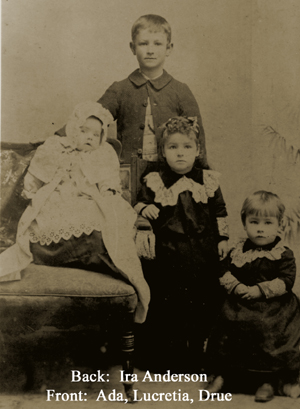
In those days we maid our own soap out of the fat from sheep and cattle, and out of the tallow I maid candels to give us light. I also maid chease and butter, salted our own meat, beef and pork and dried it, and then we smoked it. O it was delicious. I maid my own quilts, did all my sewing, washed by hand for more than 12 years. The first farm we tried to buy, did not suit Pa, so he traided it for another. That was very humble. Well, then he bought a lot so we could have a place to come to when we came to town. November 1, 1888 I had a deadborn baby boy. I was alone. Pa was out with his sheep herd. He came home a week after the baby was born. It was buried and me still in bed. We left the next day to take care of the sheep and was gone three months. He did not stay home long, as the sheep must be tended. We built a two room doughb (adobe) house on the lot we bought. The dead baby was born there on February 9, 1890 Lucretia came to make up happy. She was a darling and very good baby. Pa was still caring for the sheep, but to our bad luck on the 13th of June 1890 he fell from a load of wool and broke his leg just above the ankle. It took a year before he could do any work, so we got very poor, and he was oblige to give up the sheep herd, then we tried to farm, with very poor headway. The last farm he bought had a very poor house on it. There is where Drusilla was born July 8, 1892. In 1894 Ada was born on the same farm. We moved back to Ephraim and Hugh was born September 2, 1896, Onedia was born May 2 1889, Luella was born in Ephraim November 26, 1902. she was the sixth one Gusty Stephens, the woman nurse, helped me with, then we moved to Castle Gate, when Luella was three months old. There Pa and Ira worked for three years. Then we moved to Spring Glen. We had not been there long when Lea (Alta Lealette) came to us to make us happy. She was born July 21, 1905.
While there we had many experiences. Pa was the second counselor to Bishop Rowley. I was the president of the primary and a sister teacher.
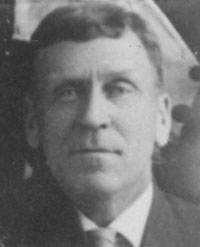
In 1908 we moved to Lake View we were there two months when I had my last baby. She was born May 17, 1908 and we named her Zoy for short. I guess we were supposed to live, or we sure would have passed on, as the doctor was not the best. When Zoy was 10 months old I took a sick spell that lasted three months. We had a big family and were so poor, and with such a small home, so what should happen-my poor mother, a widow and all alone in Castle dale, took sick. She was all alone as Dan and the family had moved to Paris, Idaho. Dan had promised to take care of her, but she didn't want to leave Castle dale. My poor mother took sick and died on the 14 of May, and was buried the day Zoy was one year old. I have felt so bad to think my dear mother should be left alone to die, but what could I do. I was sick for three months and could not go to help her.
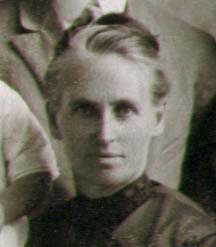
At first we planned to make Lake View our future home, but as our farm was small we could not make a living there, then we moved to Richfield. We failed there, we were 18 months there, we moved again this time to Ogden. Pa got work on the railroad and did pretty well. I was primary counselor to Sister Shurtliff in Ogden Third Ward in 1918, and worked along with her for a while, then I was called to be president May 11 1919. I was also a member of the genealogical society of Ogden, also in Poplar Grove in salt Lake.
Note-(This is as far as mother' history goes-but I will give some of the highlights from there.)
We lived in Ogden Third Ward until 1926, and had many happy times there. In 1926 we moved to 3129 Port Ave, Ogden and lived in the Ninth Ward. In February 1929 Father died, and shortly after that we moved to salt Lake-1230 Indiana Ave. Mother and I lived there together, close to Onedia's place. Onedia died in 1935 and left two boys Roland and dean. I got married Sep. 1937 and left mother alone, an in about 1948 we moved her to a real nice home at 1878 Lake street. She loved it so much. In 1956 we had to place Mother in a nursing home, as she just couldn't take care of herself. She died Oct. 31, 1957 at the age of 91. She had a wonderful personality and loved people. She was extra good in caring for children-she loved them and they loved her. Her funeral was in November in Richard's ward-where Lea and Vasco lived.
